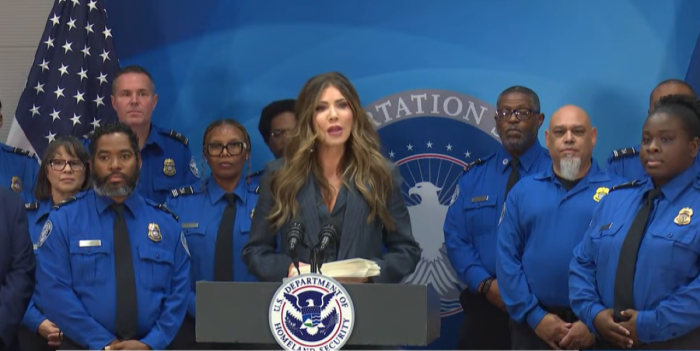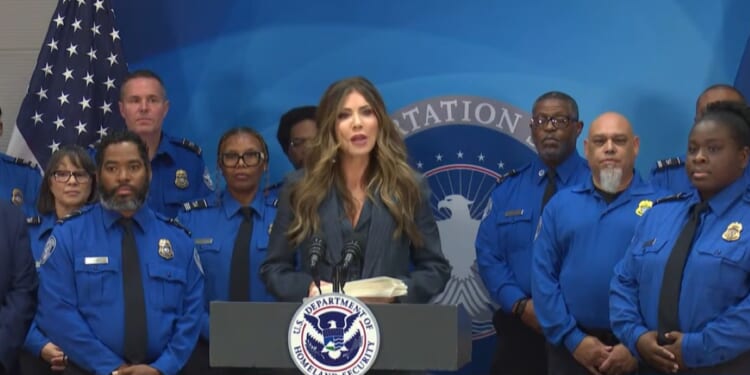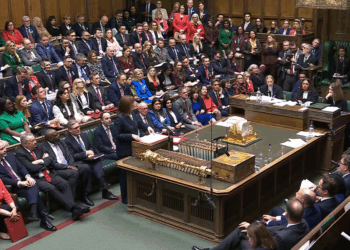
United States Secretary of Homeland Security Kristi Noem announced Thursday that Transportation Security Administration employees who worked during the government shutdown will receive $10,000 bonuses as the longest shutdown in U.S. history has come to an end.
During a Thursday press conference at Bush Airport in Houston, Texas, Noem announced that the agency was distributing bonus checks to TSA employees across the country who continued to work without pay during the government shutdown.
While Noem handed out bonus checks to several TSA workers standing beside her at the press conference who went “above and beyond” during the shutdown, she stressed that the DHS will “continue to evaluate every single employee that helped during the shutdown and stepped up and went above and beyond.”
Noem specifically singled out TSA agent Rico Walker, who works at Bush Airport, for his service during the shutdown. She noted how Walker “not only fulfilled every one of his hours during this shutdown, but he also was more than willing to take on extra shifts to make sure that the public didn’t have any kind of hardships, delays or security concerns during this government shutdown.”
Noem’s press conference and the issuing of the bonuses come less than 24 hours after President Donald Trump signed a bill into law that would fund the federal government through Jan. 30, 2026, putting an end to a government shutdown that has disrupted the federal workforce over the last six weeks.
The White House has a notice on its website showing how long the government shutdown lasted. At 42 days, 22 hours and 25 minutes, the latest government shutdown was the longest in U.S. history.
Trump’s approval of the legislation came just hours after the Republican-controlled U.S. House of Representatives approved the bill to reopen the government on Wednesday.
The vote to reopen the government fell largely along party lines, with most support coming from Republicans and most opposition coming from Democrats. Two House Republicans broke from their party to oppose the bill, Rep. Thomas Massie of Kentucky and Rep. Greg Steube of Florida.
Meanwhile, six House Democrats joined most of their Republican colleagues in backing the bill to reopen the government: Reps. Henry Cuellar, D-Texas, Don Davis, D-N.C., Jared Golden, D-Maine, Adam Gray, D-Calif., Marie Perez, D-Wash., and Tom Suozzi, D-N.Y. While the House approved legislation to fund the government two months ago, the government shut down because the bill failed to reach the 60-vote threshold necessary for passage in the Republican-controlled Senate.
The stalemate finally broke Monday night as seven Senate Democrats and Sen. Angus King, I-Maine, broke from their party to pass an amended bill that funds the government through Jan. 30, 2026, instead of through Nov. 21. It also reverses terminations of federal workers during the shutdown and ensures that federal workers receive back pay.
Although one Republican, Sen. Rand Paul, R-Ky., broke from his party to oppose the legislation, his vote was offset by support from King as well as Sens. Catherine Cortez-Masto, D-Nev.; Dick Durbin, D-Ill.; John Fetterman, D-Pa.; Maggie Hassan, D-N.H.; Tim Kaine, D-Va.; Jacky Rosen, D-Nev.; and Jeanne Shaheen, D-N.H.
Since the Senate amended the bill, the House needed to approve the changes before it could go to Trump’s desk for his signature.
Several Senate Democrats agreed to back the legislation after previously rejecting it multiple times in exchange for a promised vote on the extension of Affordable Care Act premium tax credits, thus enabling taxpayers whose income exceeds 400% of the federal poverty line to receive subsidies to reduce the cost of their health insurance.
The subsidies, which are scheduled to expire at the end of next month, emerged as a major concern for Democrats during negotiations to end the shutdown.
In addition to disruptions to air travel, the shutdown threatened to disrupt the distribution of food assistance payments known as the Supplemental Nutrition Assistance Program after the U.S. Department of Agriculture announced late last month that “the well” containing money for the tax-funded program colloquially known as “food stamps” had “run dry” and that payments would halt on Nov. 1. The issue of SNAP funding had been tied up in federal courts before the resolution of the shutdown.
Ryan Foley is a reporter for The Christian Post. He can be reached at: ryan.foley@christianpost.com

















